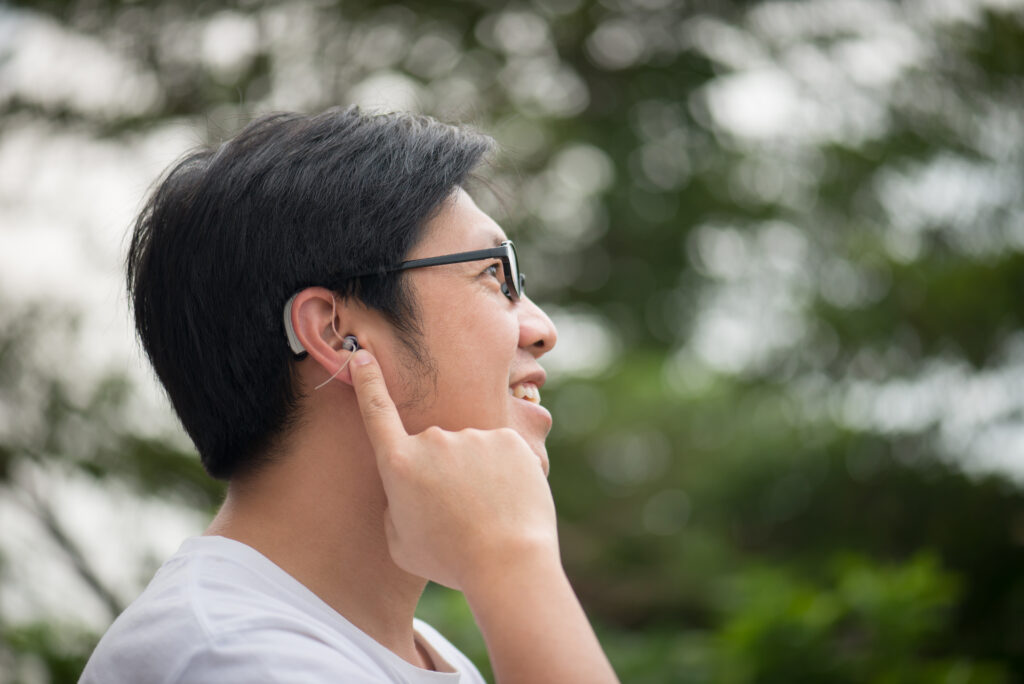
Types of hearing loss
While the causes of hearing loss are many, they are generally classed into one of three categories: sensorineural, conductive, or mixed hearing loss.
Here’s what you need to know about each of the different types of hearing loss.
Conductive hearing loss
Conductive hearing loss is a mechanical issue in the actual structure of the ear. It occurs when sound isn’t correctly conducted through to your middle ear, which is responsible for passing soundwaves through to your brain.
The problem often stems from the external ear (encompassing the ear canal to the middle ear) which is made up of the tympanic membrane (the eardrum) and ossicles (small bones behind the eardrum). Here, hearing can be compromised by obstructions and abnormalities such as:
- Abnormal bone growth in the middle ear, known as otosclerosis
- A buildup of earwax within the eardrum
- A temporary infection in the middle ear
- A buildup of fluid in the middle ear
- Perforation of the eardrum


Symptoms of conductive hearing loss
- Faint or significantly diminished sound levels.
- Pain or pressure in one or both ears
- Difficult hearing speech
- Feeling that one’s own voice sounds different
Treatment options
Conductive hearing loss can sometimes be remedied with surgical intervention. However, even with surgery, the sufferer’s hearing capacity may still be diminished. In these cases, a hearing aid can significantly restore the ability to hear.
Learn more about the causes, symptoms, and treatments of conductive hearing loss.
Sensorineural hearing loss
Even if soundwaves reach your middle ear without issue, your brain might still struggle to receive the signals necessary to perceive them. This is sensorineural hearing loss.
Previously referred to as ‘nerve deafness’, sensorineural hearing loss is caused by a problem with your inner ear (your cochlear and the associated organs). It can also be caused by issues with the nerve that connects the inner ear to the hearing centre of your brain: the vestibulocochlear (auditory) nerve.
There are three types of sensorineural hearing loss:
Sudden Sensorineural Hearing Loss (SSHL): a rapid decrease in hearing capacity often caused by an infection within the cochlea, or minuscule tears within the structure of the ear that are usually the result of a blow to the head.
Noise-Induced Hearing Loss (NIHL): occurs when the hair cells of the inner ear are damaged by prolonged (or sometimes sudden) exposure to loud sounds.
Presbycusis: the most common form of sensorineural hearing loss, presbycusis is caused by the gradual weakening of inner ear structures in old age.


Symptoms of sensorineural hearing loss
- Tinnitus
- Muffled hearing
- Nausea or vertigo
- A sensation of sounds being loud enough but still difficult to understand.
Treatment options
Because sensorineural hearing loss originates deep in the inner ear and/or brain, it’s often not able to be corrected surgically. Hearing aids are generally the best course of action, however, a cochlear implant may be required if the hearing loss is profound.
Learn more about the causes, symptoms, and treatments of sensorineural hearing loss.
Mixed hearing loss
In some cases, hearing loss can be the result of combined sensorineural and conductive factors. This is known as mixed hearing loss.
If you’re unable to determine the cause of your hearing loss, consult with a specialist ENT (ear, nose, throat) doctor as soon as possible.
Retrocochlear hearing loss
Retrocochlear hearing loss is caused by damage or abnormalities to the nerve pathways that connect the inner ear to the brain (the auditory nerve). This can result from infection, vascular and metabolic conditions, certain medications, and general aging – among other causes.
Depending on the underlying cause and severity of the hearing loss, surgery is sometimes a viable option. In many cases, however, retrocochlear hearing loss is best managed with a custom-fitted hearing aid.


Struggling with hearing loss?
If some of these symptoms ring true for you, you may be experiencing one of the types of hearing loss (or a combination of both). Thankfully, modern technology has created hearing aids that deliver amazing hearing improvements while remaining virtually undetectable.
Bay Audio are the hearing technology experts and can find the perfect hearing aid for you to ensure you can continue to enjoy life as normal. A comprehensive hearing test is the only way to confirm the type and extent of your hearing loss. Book a hearing test with one of our experts today.
Book a hearing test with one of our experts today.
Book an appointment with one of Bay Audio’s expert audiologists to find the hearing aid that’s right for you.
